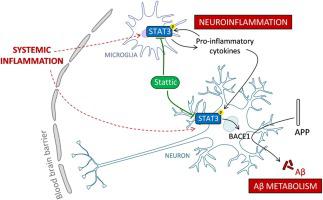Immunology Letters ( IF 3.3 ) Pub Date : 2020-10-21 , DOI: 10.1016/j.imlet.2020.10.004 Périne Millot 1 , Carine San 2 , Evangeline Bennana 1 , Baptiste Porte 1 , Nicolas Vignal 3 , Jacques Hugon 1 , Claire Paquet 1 , Benoit Hosten 2 , François Mouton-Liger 1

|
转录因子 STAT3(信号转导和转录激活因子 3)的异常激活最近与阿尔茨海默病 (AD) 相关。STAT3 磷酸化对于与神经炎症相关的细胞因子分泌至关重要。此外,STAT3 可能充当 BACE1(β-APP 裂解酶-1)的转录调节因子,BACE1 是淀粉样蛋白 β (Aβ) 产生的关键酶。我们之前已经表明,野生型小鼠中 LPS 诱导的全身炎症引发的神经炎症和脑 BACE1 水平升高与 STAT3 激活增强有关。使用该 LPS 模型,本研究的目标是调查 STAT3 抑制剂给药是否可以预防神经炎症和异常 BACE1 调节。我们的结果表明,腹腔注射 Stattic,一种选择性抑制 STAT3 激活的分子,可降低海马中 LPS 诱导的小胶质细胞激活。此外,STAT3 抑制降低了由 LPS 全身给药触发的细胞因子 IL-6、IL-1β 和 TNF-α 的脑水平。与单独暴露于 LPS 的小鼠相比,在 LPS 和 Stattic 处理的小鼠海马体中观察到 BACE1 水平显着降低。总之,我们的结果表明 Stattic 可以保护海马体免受 AD 的两个病理特征的影响,并为进一步探索 STAT3 抑制在 AD 中的治疗潜力铺平了道路。与单独暴露于 LPS 的小鼠相比,在 LPS 和 Stattic 处理的小鼠海马体中观察到 BACE1 水平显着降低。总之,我们的结果表明 Stattic 可以保护海马体免受 AD 的两个病理特征的影响,并为进一步探索 STAT3 抑制在 AD 中的治疗潜力铺平了道路。与单独暴露于 LPS 的小鼠相比,在 LPS 和 Stattic 处理的小鼠海马体中观察到 BACE1 水平显着降低。总之,我们的结果表明 Stattic 可以保护海马体免受 AD 的两个病理特征的影响,并为进一步探索 STAT3 抑制在 AD 中的治疗潜力铺平了道路。

"点击查看英文标题和摘要"


















































 京公网安备 11010802027423号
京公网安备 11010802027423号